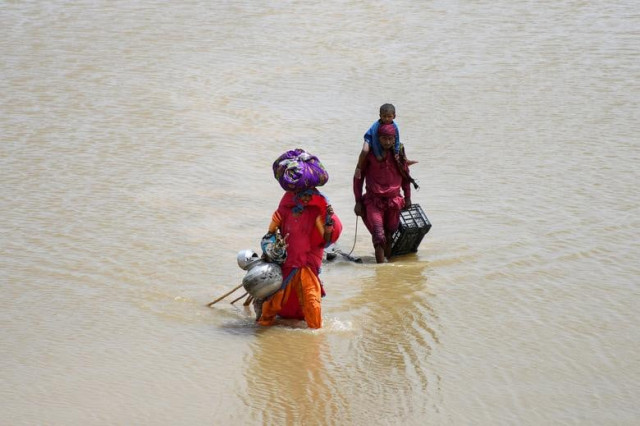Over 10m lack access to safe water in flood-hit areas
Unicef says Pakistani children’s needs must be prioritised in flood recovery plans

More than 10 million people, including children, living in flood-affected areas remained deprived of safe drinking water, the United Nation’s agency for children warned on Tuesday, six months after the devastating floods ravaged parts of Pakistan.
On the eve of World Water Day, Unicef said in a new release that the floods damaged most of water systems in affected areas, forcing more than 5.4 million people, including 2.5 million children, to solely rely on contaminated water from ponds and wells.
“Six months after catastrophic floods … more than 10 million people, including children, living in flood-affected areas remain deprived of safe drinking water, leaving families with no alternative but to drink and use potentially disease-ridden water,” it said.
Even before the floods, the news release said, despite the country’s drinking water supply system covering 92% of the population, only 36% of the water was considered safe for consumption.
“Safe drinking water is not a privilege, it is a basic human right,” said Abdullah Fadil, the Unicef representative in Pakistan. “Yet, every day, millions of girls and boys in Pakistan are fighting a losing battle against preventable waterborne diseases and the consequential malnutrition,” he continued.
“We need the continued support of our donors to provide safe water, build toilets and deliver vital sanitation services to these children and families who need them the most,” Fadil added.
The prolonged lack of safe drinking water and toilets, along with the continued proximity of vulnerable families to bodies of stagnant water are contributing to the widespread outbreaks of waterborne diseases such as cholera, diarrhoea, dengue, and malaria.
At the same time, open defecation has increased by more than 14% in the flood-affected regions. To make matters worse, the lack of proper toilets is disproportionally affecting children, adolescent girls and women who are at added risk of shame and harm.
Besides, unsafe water and poor sanitation are key underlying causes of malnutrition. The associated diseases, such as diarrhoea, prevent children from getting the vital nutrients they need.
“Malnourished children are more susceptible to waterborne diseases due to already weakened immune system, which simply perpetuates a vicious cycle of malnutrition and infection,” the news release warned.
Tragically, it added, one-third of all child deaths globally are attributable to malnutrition and half of all undernutrition cases were linked to infections caused by a lack of access to safe water, adequate sanitation and good hygiene.
“In Pakistan, malnutrition is associated with half of all child deaths. In flood affected areas, more than 1.5 million boys and girls are already severely malnourished, and the numbers will only rise in the absence of safe water and proper sanitation.”
Unicef has been on the ground with partners since the first day of the climate-induced floods hit Sindh, Balochistan and Khyber Pakhtunkhwa provinces. After the floods, Unicef has installed numerous hand-pumps and water storage facilities.
In the past six months, Unicef has also distributed hygiene kits to more than 1.3 million people besides supporting the rehabilitation and rebuilding of water supply facilities, benefiting over 450,000 people.
Ahead of World Water Day, Unicef called upon the government, donors and partners to urgently allocate resources to restore access to safe drinking water and toilets and invest in climate-resilient safe drinking water supply facilities.
“It is imperative that the voices and the needs of children in Pakistan are prioritised at all costs and that children are placed at the heart of all post-flood recovery and resilience plans,” said Fadil.
Unicef said that more than 9.6 million children still required access to essential social services even six months after the devastating floods. However, its appeal of $173.5 million remained less than 50% funded.



















COMMENTS
Comments are moderated and generally will be posted if they are on-topic and not abusive.
For more information, please see our Comments FAQ